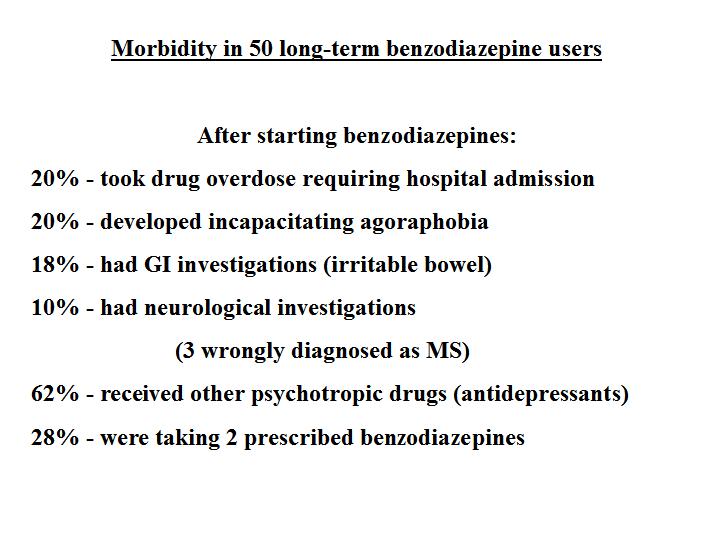What are the risks of choosing to remain on benzodiazepines long term?

Anyone who is already dependent on prescribed benzodiazepines should be allowed the decision on whether to stay on the drugs or to come off. People who are pushed into withdrawal against their will tend to do badly. W-BAD’s mission and objectives do not include regulating the drugs to where people who are already physically dependent on them will be forced off in any way. There are some populations too that may be too fragile or sick to undertake a withdrawal program (e.g., the very elderly). That said, there are major risks that accompany choosing to stay on the drugs long term. Each iatrogenically dependent person will have to weigh the risks for themselves and should be free to make the decision as to whether to continue taking the drugs or to attempt a slow, controlled taper off. Some o the risks of continuing to take benzodiazepines long term are detailed below.
Risks:
- Development of Tolerance and Tolerance Withdrawal
- Increased risk of over-sedation
- Adverse effects in pregnancy, should the prescribed user be of child-bearing age
- Risk for seizure
- Risk for developing paradoxical effects or having the drug “turn on you”
- Risks of endocrine effects: increased cortisol, prolactin, growth hormone secretion causing menstrual irregularities, pre-menstrual tension, breast engorgement, gynecomastia, and galactorrhoea.
- Increased risk of possible neurotoxic effects: structural brain damaged and abnormal CAT scans
- Increased risk of polypharmacy (and if there is polypharmacy, increased risk for death when benzodiazepines are combined with some medications).
- Physical Dependence
- Possibly delaying the inevitable, that one will have to face withdrawal eventually and it may be more severe and enduring the longer you are on the BZ prior to withdrawing
- Staying on the drug keeps the BZ-patient “at the mercy of” the prescriber and they are always at at risk for being “cut off” and forced into a rapid taper or cold turkey situation if the clinician decides to stop prescribing
- Increased monetary cost due to cost of repeat prescriptions, repeat doctor visits
- Increased risk of high medical costs due to benzodiazepines being responsible for frequent emergency and medical visits
- Increased risk of misdiagnosis (from symptoms that are caused by benzodiazepines, but not attributed to them)
- Worsening of the original condition (benzodiazepines worsen anxiety/depression/insomnia/PTSD, etc. long-term)
- Increased risk for developing new psychiatric problems that you never had prior (e.g. agoraphobia, panic, terror, fear, obsessions, and compulsions, etc.)
- Increased risk of dose-escalation (due to tolerance to the original doses) or the addition of a second benzodiazepine and/or Z-drug

- Increased risk of respiratory complications in the elderly
- Possible increased risk of cancer
- Increased risk of developing cognitive impairment
- Possible increased risk of dementia and Alzheimer’s
- Increased risk of falls and accidents
- Increased risk of car accidents in the elderly
- Increased risk of hip fracture and femur fracture
- Increased risk of memory loss (which may or may not be permanent)
- Losing relationships/jobs due to personality & emotional changes/ poor function
- Increased risk of suicidality and depression
- Increased risk for violence
- Increased risk of homicidal behavior
- Increased risk for dangerous or disinhibited behavior
- Increased risk of muscle wasting/loss of muscle mass
- Increased risk for emotional blunting/apathy/anhedonia
- Increased risk for sleep disturbances (which can cause long-term poor health)
- Increased risk of death
- Increased risk of sickness (e.g. flu) due to lowered immune response from benzodiazepine use
- Increased risk of accidental overdose, especially in elderly (however, in all populations as well. The cognitive impairment that benzodiazepines cause may cause someone to forget that they’ve already dosed the pill. They may also develop “pseudoaddiction” in attempt to ward off tolerance withdrawal symptoms, where they take more benzodiazepine which could lead to accidental overdose)
- Increased risk of stroke and pneumonia in Alzheimer’s patients
- Increased risk of GI disturbances